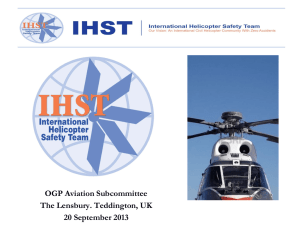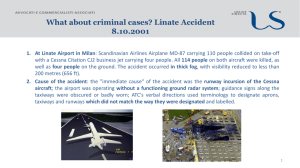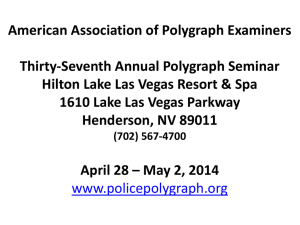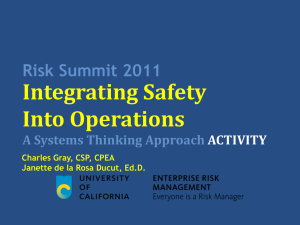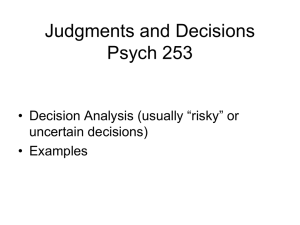Introduction of Safety Workshop - HeliExpo 2013
advertisement
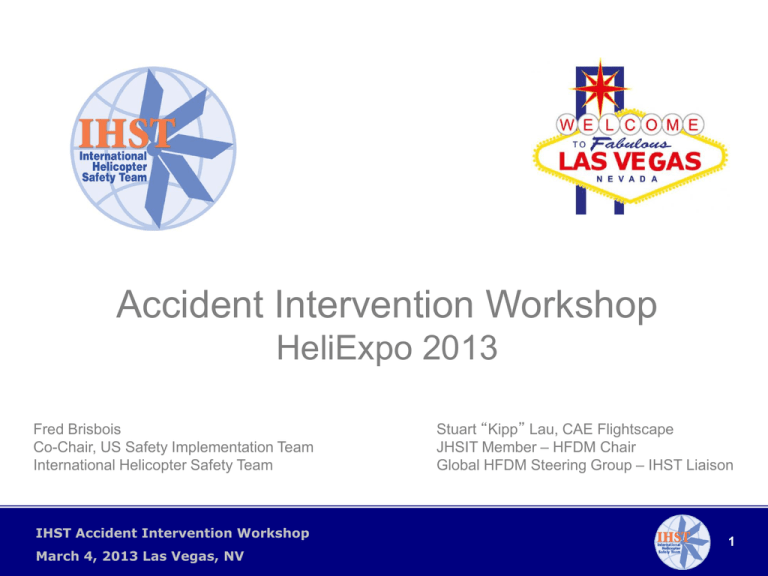
Accident Intervention Workshop HeliExpo 2013 Fred Brisbois Co-Chair, US Safety Implementation Team International Helicopter Safety Team IHST Accident Intervention Workshop March 4, 2013 Las Vegas, NV Stuart “Kipp” Lau, CAE Flightscape JHSIT Member – HFDM Chair Global HFDM Steering Group – IHST Liaison 1 IHST Goal: To reduce worldwide helicopter accident rate by 80% by 2016! IHST Accident Intervention Workshop March 4, 2013 Las Vegas, NV 2 Welcome to Las Vegas • Introduction to IHST Accident Intervention Workshop • Safety Brief • Sponsors – Door Prizes (Biz Cards) • Workshop Format – – – – 9 Excellent Presentations 4 Modules (~1 hr each) 1 Breaks (~20 min) Networking Event (45 min) IHST Accident Intervention Workshop March 4, 2013 Las Vegas, NV • Topics include: – Intro to Safety Management Systems (SMS) – SMS Implementation at a small operator – Infrastructure WG update – CFIT/Wire Strike Prevention – Training WG Update – Maintenance WG Update – Helicopter Flight Data Monitoring (HFDM) 101 – Integrating HFDM in a SMS – Heath and Usage Monitoring Systems (HUMS) 101 3 Rules of the road • It’s a workshop: Participate, ask questions, interact, network… • Success is measured by gaining knowledge, finding new resources and establishing new contacts. • Stick around until the end: We’ll entice you with fabulous gifts (door prizes) and refreshments. • The one caveat: the IHST does not endorse any commercial products or services. IHST Accident Intervention Workshop March 4, 2013 Las Vegas, NV 4 A special thanks to our sponsors! Afternoon Break Networking Event IHST Accident Intervention Workshop March 4, 2013 Las Vegas, NV 5 Fabulous Door Prizes Samsung Galaxy Note giveaway X-3 model giveaway IHST Accident Intervention Workshop March 4, 2013 Las Vegas, NV 6 IHST’s attitude towards safety: • IHST takes a proactive attitude that anyone’s helicopter accident belongs to all of us. • Accidents affect our collective reputation as providers of air transportation and suppliers of air services… • We don’t need to accept accidents or a high industry accident rate, and it affects our profitability if we do so. – Jack Drake, IHST JHSAT Accident Analysis Group – Presented at ISASI 2008 IHST Accident Intervention Workshop March 4, 2013 Las Vegas, NV 7 ORGANIZATION STRUCTURE IHST Joint Helicopter Safety Analysis Team (JHSAT) Joint Helicopter Safety Implementation Team (JHSIT) •Data analyses •Safety enhancement development Joint Helicopter Implementation Measurement Data Analysis • Results Team (JHIMDAT) measurements IHST Accident Intervention Workshop March 4, 2013 Las Vegas, NV 8 8 U.S. ANALYSIS 523 Accidents Analyzed 210 pages 176 pages 197 Accidents in 2000 174 Accidents in 2001 184 pages 152 Accidents in 2006 Compendium Report for 2000, 2001, 2006 Accidents IHST Accident Intervention Workshop March 4, 2013 Las Vegas, NV 9 9 4 Buckets: Based on JHSAT recommendations today’s topics include training, flight data monitoring, maintenance, safety management systems and other technologies that enhance rotorcraft safety. (TOP 20 Systems and Equipment (Kipp/Fred) Autorotation HFDM SMS (Bryan Smith) Awareness cues critical to safe flight Maintenance (Chris Meinhardt) Personal Risk Mgt Continued Airworthiness Proc. Simulators Mission Specific Risk Mgt HUMS Emergency Company Risk Mgt Maint. Quality Assurance CFI TAWS JHSAT IR follow) IHST Accident Intervention Workshop March 4, 2013 Las Vegas, NV Training (Nick Mayhew) Power/Energy Mgt Preflt Operational Risk Mgt 10 TOP 20 INTERVENTION RECOMMENDATIONS CY2000, CY2001, CY2006) U.S. Compendium report D2010 - Install cockpit recording devices. (52.8%) Develop and install FDM equipment to record the actions of the flight crew. Data can be used as local immediate feedback to trainers, operators and flight crews. The data could also aid in the event of accident investigation to support a more complete analysis and future safety recommendations. ✔ T2010 - Autorotation Training Program. (13%) Improve autorotation training in both primary and advanced flight training and develop simulator programs to improve autorotation skills. ✔ M3010 - Follow ICA Procedures with Confirmation of Compliance. (11.9%) Ensure that maintainers and operators are aware of the importance of following the manufacturer’s maintenance manuals and practices. Require Regulators to enforce regulations that require the use of the manufacturer’s maintenance manuals and practices. ✔ T2060 - Simulator Training - Advanced Maneuvers. (10.9%) Incorporate simulator programs into training program that would include dynamic rollover, Emergency Procedures Training, Ground resonance, quick stop maneuvers, targeting approach procedures and practice in pinnacle approaches, unimproved landing areas, and elevated platforms ✔ IHST Accident Intervention Workshop March 4, 2013 Las Vegas, NV 11 TOP 20 INTERVENTION RECOMMENDATIONS CY2000, CY2001, CY2006) U.S. Compendium report S8050 - Personal Risk Management Program (IMSAFE). (10.1%) Encourage the implementation and use of a personal Risk Management program and utilize the IMSAFE checklist. ✔ T6019 - Training emphasis for maintaining awareness of cues critical to safe flight. (9.0%) Establish training programs that train and evaluate proficiency of critical issues such as systems failures, impending weather concerns, effects of density altitude, and wind and surface conditions that can become critical to safe flight. ✔ M1010 - Better Maintenance/Quality Assurance oversight to ensure adherence to the ICA/Manual. (8.2%) Encourage operators and maintainers to implement a robust Quality Assurance program that ensures the use of manufacturers maintenance manuals, service bulletins, and procedures. ✔ S8040 - Mission Specific Risk Management Program. (7.8%) A formal Safety Management System (SMS) requires training for specific missions, the establishment and enforcement of standard operating procedures, provisions and training of personnel to use risk assessment tools, and most importantly changing the safety culture to ensure that all personnel put “Safety’ first. ✔ T1020 - Enhanced Aircraft Performance & Limitations Training. (7.1%) Operators should provide robust training and continual evaluation of their pilots on aircraft performance. This training should include the effects of density altitude, gross weight and flight manual limitations✔ IHST Accident Intervention Workshop March 4, 2013 Las Vegas, NV 12 TOP 20 INTERVENTION RECOMMENDATIONS CY2000, CY2001, CY2006) U.S. Compendium report T2050 - Emergency Procedures Training. (6.9%) Encourage the use of EP trainers with the emphasis on Loss of System, Recognition and Recovery training. ✔ T3030 - CFI judgment and decision making training to follow student more closely. (6.9%) Require CFIs to participate and show proficiency in Aeronautical Decision Making (ADM) training programs and recognize the typical student errors training before they exercise the privileges of their certificate. ✔ E2050 - Install Proximity Detection System. (6.7%) Utilization of this technology would provide proximity detection equipment that would aid in identifying ground obstructions. This operational enhancement would prove to be valuable due to the requirement of helicopters to operate in close proximity to obstacles. ✔ T1050 - In-flight Power/Energy Management Training. (6.5%) Require increased training and documented proficiency evaluation of power/energy management issues. This training improvement should include detailed training on flight manual information related to density altitude, and weight and performance issues of each aircraft the pilot will operate. ✔ S8005 - Establish/Improve Company Risk Management Program. (6.5%) Require the establishment and/or improvement of company risk management programs which would include the hazard identification and analysis and risk assessment and control. IHST SMS Toolkit provides a scalable SMS program for any size of operation. ✔ IHST Accident Intervention Workshop March 4, 2013 Las Vegas, NV 13 TOP 20 INTERVENTION RECOMMENDATIONS CY2000, CY2001, CY2006) U.S. Compendium report D2020 - Install Data Recording Devices. (6.3%) Develop and install FDM equipment to record the actions of the flight crew. Data can be used as local immediate feedback to trainers, operators, and flight crews. The data could aid in investigations to support more complete analysis and future recommendations.✔ S8010 - Use Operational Risk Management Program (Preflight). (6.1%) The use of a continual cyclic process which includes risk assessment, risk decision-making, and implementation of risk controls, would have positive results in the area of acceptance, mitigation, or avoidance of risk and is essential for aviation safety. ✔ S8020 - Use Operational Risk Management Program (In-flight). (5.7%) Develop and incorporate into flight operations a risk management tool that provides pilots and crews with a method of evaluating the various hazards and risk of each mission. Include a checklist for use while airborne on the use of decision-making. ✔ T1060 - Simulator Training – Basic Maneuvers. (5.4%) Develop and implement a standard for pilot training focusing on operational specific scenarios, human factors, and the use of simulators and flight training devices (FTDs). ✔ T6017 - Risk Assessment/Management Training. (5.4%) Require the establishment and/or improvement of the company safety training which includes risk management programs emphasizing weather decisionmaking tools. ✔ IHST Accident Intervention Workshop March 4, 2013 Las Vegas, NV 14 JHSIT WORKING GROUPS Strategic Areas of Intervention Safety Management X ✔ Training X Bryan Smith US JHSIT Covers it all! Systems, Equipment & Information (HFDM, HUMS) Maintenance X X Nick Mayhew Infrastructure Kipp Lau (FDM, HUMS, etc...) X X Chris Meinhardt Tom Judge * Reason, 1990 IHST Accident Intervention Workshop March 4, 2013 Las Vegas, NV Accident 15 Workshop Agenda: Module 1 • Module 1. SMS, SMS Implementation – Introduction to SMS, Bryan Smith, IHST SMS WG Lead – Implementing SMS in a small operation, Sunshine McCarthy, Baldwin Aviation IHST Accident Intervention Workshop March 4, 2013 Las Vegas, NV 16 Workshop Agenda: Module 2 • Module 2. Infrastructure, Object Strikes – Infrastructure WG update, Dr. Tom Judge, IHST Infrastructure WG Lead – CFIT/Wire Strike Prevention – “Breaking the Chain,” Jerry Henry, Sandel Avionics IHST Accident Intervention Workshop March 4, 2013 Las Vegas, NV 17 Workshop Agenda: Module 3 • Module 3. Training and Maintenance – Training WG Update, Nick Mayhew, IHST Training WG Lead – Maintenance WG Update, Chris Meinhardt, IHST Maintenance WG Lead IHST Accident Intervention Workshop March 4, 2013 Las Vegas, NV 18 Workshop Agenda: Module 4 • Module 4. Flight Data and SMS Implementation – HFDM 101, Mike Pilgrim, Co-Chair Global HFDM Steering Group – Integrating HFDM in a SMS, Sonya Tietjan, Gael Ltd. – HUMS 101, Danny Green, IHST HFDM/HUMS WG member IHST Accident Intervention Workshop March 4, 2013 Las Vegas, NV 19 Survey says… IHST Accident Intervention Workshop March 4, 2013 Las Vegas, NV 20 www.ihst.org IHST Accident Intervention Workshop March 4, 2013 Las Vegas, NV 21 www.ihst.org IHST Accident Intervention Workshop March 4, 2013 Las Vegas, NV 22 www.ihst.org Fact Sheets, Essays, Reports, Brochures, Presentations and More… IHST Accident Intervention Workshop March 4, 2013 Las Vegas, NV 23 Remember: “What happens in Vegas…stays in Vegas.” just ask Prince Harry Thank you! STUART.LAU@CAE.COM IHST Accident Intervention Workshop March 4, 2013 Las Vegas, NV 24
